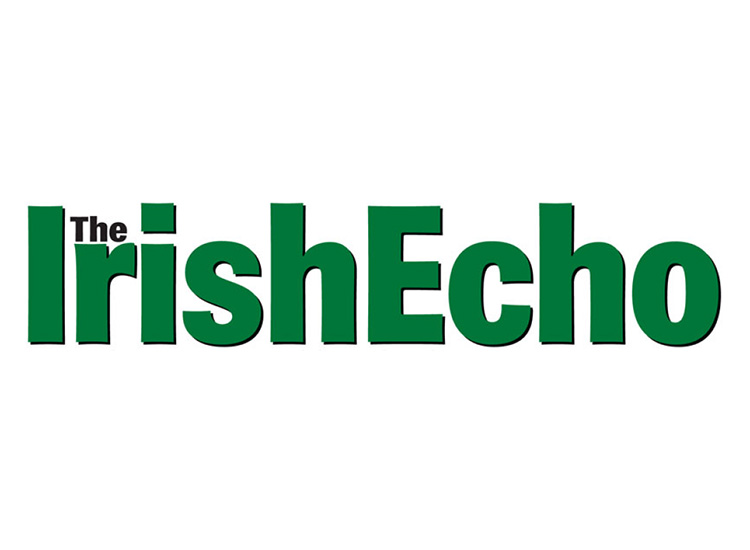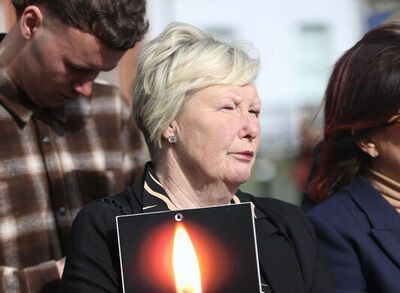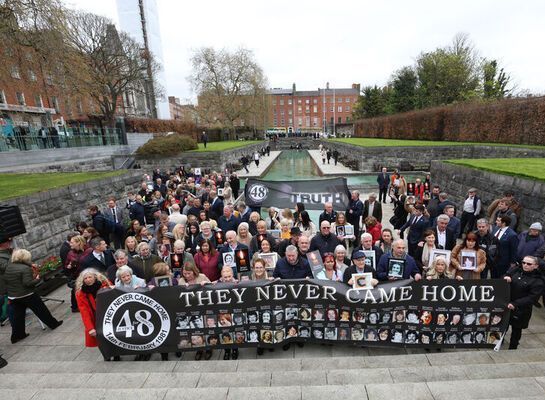Lankum pictured before a performance on New York's Lower East Side last October. PHOTO BY PETER MCDERMOTT
By Daniel Neely
On Saturday night, Lankum broadcast “A National Disgrace,” a nearly two hour-long concert extravaganza shot in Dublin’s historic Abbey Theatre. It was spectacular event. Daring and multifaceted, it spoke to the permanence of the band’s recorded output, the vitality of their live shows, their interest in Irish music history, their politics, and the uncertainty of the current historical moment.
The band’s performance was stunning. Each of the band’s members (Ian and Daragh Lynch, Cormac MacDiarmada, and Radie Peat) was in top form and together they wove a majestic, unforgettable set. What gave the show its theatricality, however, was the use of archival sounds (early 20th century commercial and field recordings) and the inclusion of performers from different genres and styles, both of which added to the moment in crucial, unexpected, jarring, and sometimes confrontational ways.
The guests included Al Lynch, Acid Granny (acidgranny.bandcamp.com), Sean Fitzgerald from the Deadlians (thedeadlians.bandcamp.com), Andy the Doorbum (andythedoorbum.com), Hugh Cooney (www.hughcooney.ie),The Mary Wallopers (marywallopers.bandcamp.com), Natalia Beylis (nataliabeylis.bandcamp.com), Tony Cantwell (twitter.com/tonyhorror), and Kneecap (twitter.com/KNEECAPCEOL). Some of these cameos were humorous, some were serious, but all worked and played a part in the journey.
Lankum, who had seen their stateside profile rise earlier in the year through things like a NPR Music Tiny Desk Concert and a performance at WGBH's Fraser Performance Studio in Boston, did well by building scarcity into this event. It was a ticketed show and only available to stream for 24 hours after the initial presentation. As of now, I know of no plans for a subsequent presentation. This gave the show a sense of urgency and made it feel very much like a real “concert,” which was a most welcome sensation given the last several months. Should “A National Disgrace” become available again, it is very much worth checking out – it was terrific. You can keep up with Lankum’s future doings on Twitter at twitter.com/LankumDublin.
Oversight rectified
In other news, I recently noticed a Facebook post by Hilari Koehler that said “Mike McHale’s Favourites,” the two tune books Mike McHale had published in 2017, had been keeping her and her husband Benedict company through the lockdown and that she thought he still had copies. I somehow failed to pick up copies when they were launched at the Catskills Irish Arts Week three years ago, but I managed to rectify that oversight. I reached out to McHale and a few days later there they were, in my mailbox. They’re simply delightful collections, rife with lovely tunes and interesting settings that reflect a life in the music.

Music has been part of McHale’s world since the beginning. Born in Tulsk, Co. Roscommon, he was exposed very early on because his father played accordion. However, his kitchen had a board floor, which made it attractive for dancing. The frequent house parties that ensued attracted all the area’s old time musicians, which meant McHale was exposed to the soul of the tradition very early on. He received his first tin whistle at six and his first flute at ten and worked hard to be heard. His perseverance paid off: he a co-founder of the Killina Céilí Band, and in 1958 won the Connaught flute and the All-Ireland tin whistle championships.
McHale emigrated in 1959 and landed in Boston, where he connected with legendary musicians like Seán McGlynn, Paddy Cronin & others, and performed with the New State Céilí Band. Then, in 1967, he moved to East Durham, and continued making music up there. After a break in playing, he got back into it again at the behest of Jack Coen. This rebirth resulted in “The Schoolmaster’s House,” a CD he recorded in 2000.
But perhaps McHale’s most important work – and the thing that recommends these books most highly – was that he was a renown teacher. He (alongside Charlie Coen) organized sessions & concerts and did workshops at places like the Rhinecliff Hotel and Catskills Irish Arts Week, where he taught these tunes and nurtured a community of vibrant young players. Some of them, like Dan Gurney and Dylan Foley, have gone on to do incredible things in the music.
McHale’s life in music is reflected in these books. There are two volumes, the first consists solely of reels, while the second covers jigs and hornpipes, and folks should buy both. There are lots of really great tunes here, some well known, some not. Each is presented with dates, as if taken directly from the workshops. Most provide a year, some include a month, and some are handwritten, while some were set in notation software. All of this adds up to a charming presentation that feels very personal and “handed down” – traces of a living repertory that not only reflects old Roscommon and 60s Boston, but its extension in upstate New York. If you’re a player – or if you know one – these books are a must have. To inquire about purchasing “Mike McHale’s Favourites,” reach out to McHale directly at mchale9@gmail.com.










